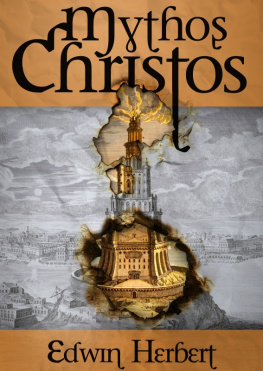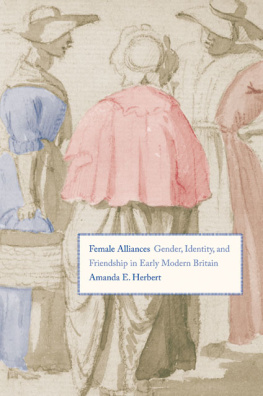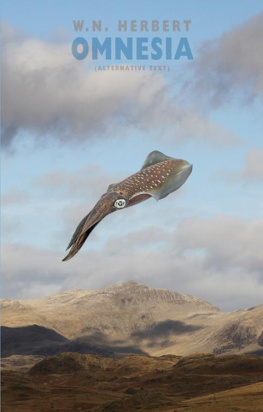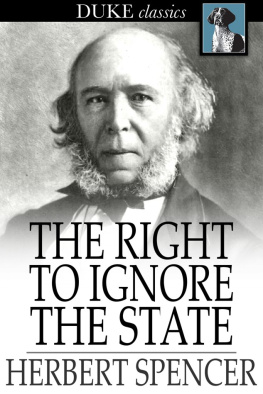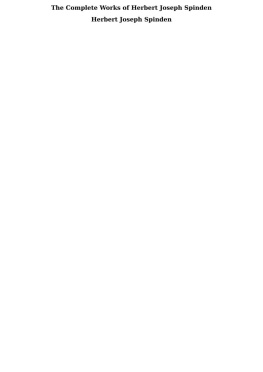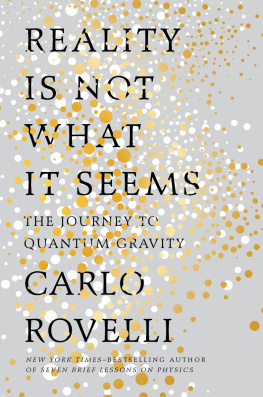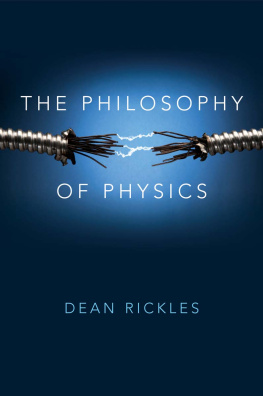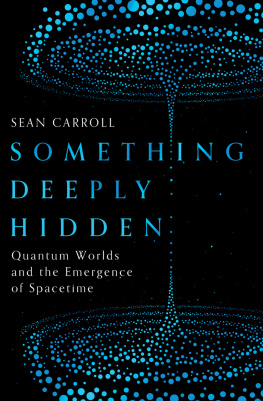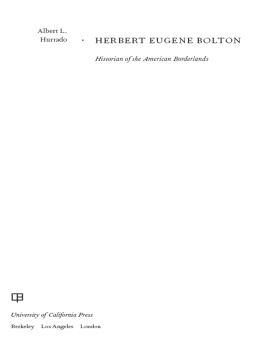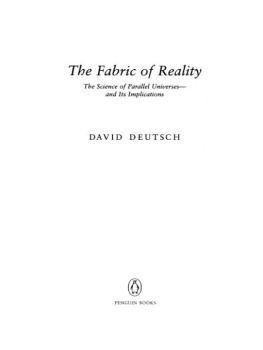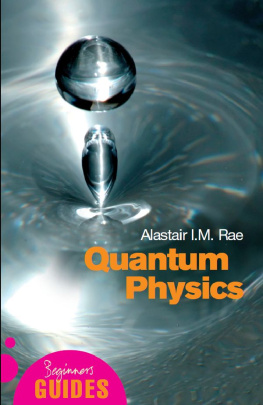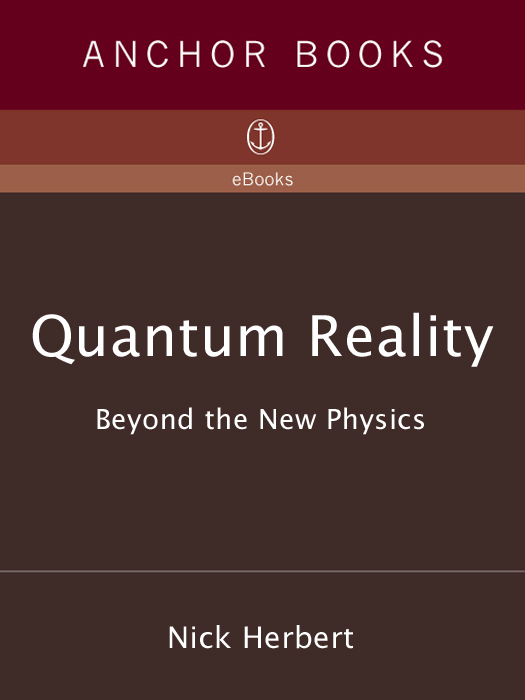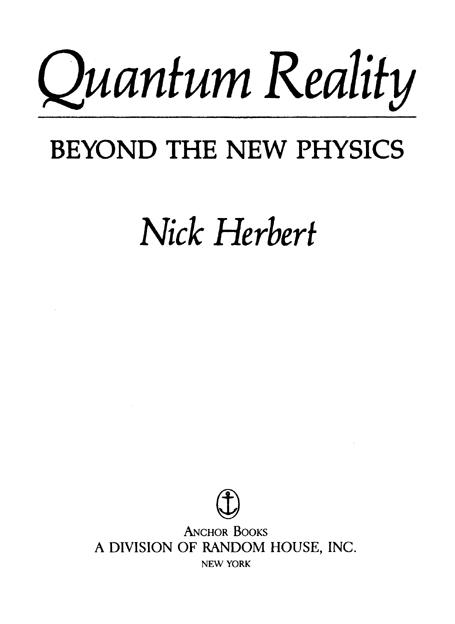A NCHOR B OOKS E DITIONS , 1985, 1987
Copyright1985 by Nick Herbert
All rights reserved under International and Pan-American Copyright Conventions. Published in the United States by Anchor Books, a division of Random House, Inc., New York, and simultaneously in Canada by Random House of Canada Limited, Toronto. Originally published in hardcover in the United States by Anchor Books in 1985.
Anchor Books and colophon are registered trademarks of Random House, Inc.
Library of Congress Cataloging-in-Publication Data
Herbert, Nick.
Quantum reality.
1. Quantum theoryPopular works. I. Title.
QC174.12.H47 1985 530.12 82-46033
eISBN: 978-0-307-80674-1
www.anchorbooks.com
v3.1
To my father
Contents
Preface
One of the curious features of modern physics is that in spite of its overwhelming practical success in explaining a vast range of physical phenomena from quark to quasar, it fails to give us a single metaphor for how the universe actually works. The old mechanical metaphor The world is a giant clock condensed in one image the principal features of Newtonian physicsnamely, atomicity, objectivity, and determinism. However, physicists today do not possess a single metaphor that unites in one image the principal features of quantum theory. The main purpose of Quantum Reality is to examine several tentative images of the world proposed by quantum physicists.
The search for a picture of the way the world really is is an enterprise that transcends the narrow interests of theoretical physicists. For better or for worse, humans have tended to pattern their domestic, social, and political arrangements according to the dominant vision of physical reality. Inevitably the cosmic view trickles down to the most mundane details of everyday life.
In the Middle Ages, when virtually everyone believed the world to be the personal creation of a divine being, society mirrored the hierarchy that supposedly existed in the heavens. Dantes picture of this world as a series of concentric spheresheaven the largest; next, the planets crystalline spheres; down through our Earths concentric elements, the whole supported by the seven circles of hellgave everything and everyone his proper place in the medieval scheme of things, from the divine right of kings down to the abject obedience of the lowliest serf. Most people accepted this hierarchical structure without question because it represented the way the world really is.
The Newtonian revolution toppled the reign of the crystal spheres and replaced it with a physics of ordinary matter governed by mathematical laws rather than divine command. Coincident with the rise of Newtonian physics was the ascent of the modern democracy which stresses a rule of laws rather than men and which posits a theoretical equality between the parts of the social machinery. The Declaration of Independence, for example, We hold these truths to be self-evident reads more like a mathematical theorem than a political document. As above, so below. The egalitarian mechanism that Newton discovered in the heavens has insinuated itself into every aspect of ordinary life. For better or for worse, we live today in a largely mechanistic world.
Just as Newton shattered the medieval crystal spheres, modern quantum theory has irreparably smashed Newtons clockwork. We are now certain that the world is not a deterministic mechanism. But what the world is we cannot truly say. The search for quantum reality is a search for a single image that does justice to our new knowledge of how the world actually works.
Many aspects of quantum theory are public knowledge, such as the notion that all elementary events occur at random, governed only by statistical laws; that there is a least thing that can happenMax Plancks irreducible constant of action; and that Heisenbergs famous uncertainty principle forbids an accurate knowledge of a quantum particles position and momentum. A successful quantum reality would incorporate this knowledge, and much more, into a single comprehensive metaphor for the way the world really is.
I first encountered the quantum reality question in graduate school when I learned to describe the behavior of atoms, molecules, and elementary particles in the mathematical language of quantum theory. Quantum theory is peculiar in that it describes a measured atom in a very different manner than an unmeasured atom.
The measured atom always has definite values for its attributes (such as position and momentum), but the unmeasured atom never does. Every atom in the world thats not actually being measured possesses (in the mathematical description at least) not one but all possible attribute values, somewhat like a broken TV set that displays all its channels at the same time.
Of course I wondered what sort of reality this strange symbolization of the unmeasured world actually stood for. Were the attributes of unmeasured atoms multivalued, fuzzy, nonexistent, or simply unknown?
However, when I asked my teachers what quantum theory actually meantthat is, what was the reality behind the mathematicsthey told me that it was pointless for a physicist to ask questions about reality. Best to stick with the math and the experimental facts, they cautioned, and stop worrying about what was going on behind the scenes. No one has expressed physicists reluctance to deal with quantum reality better than Richard Feynman, a Nobel laureate now at Cal Tech, who said, I think it is safe to say that no one understands quantum mechanics. Do not keep saying to yourself, if you can possibly avoid it, but how can it be like that? because you will go down the drain into a blind alley from which nobody has yet escaped. Nobody knows how it can be like that.
For the sake of having something in mind while I did my quantum calculations, I imagined that an atom always possessed definite values for all its attributes (just like an ordinary object) whether that atom was measured or not. However, the process of measurement disturbs the atom so profoundly that its measured attributes bear only a statistical relation to its unmeasured attributes. I felt sure that such a disturbance model of measurement was capable of accounting for quantum randomness, the Heisenberg uncertainty relations, and other quantum mysteries as well. In this disturbance picture, an atoms actual position and momentum are always definite but usually unknown; its measured position and momentum cannot be accurately predicted because the measuring device necessarily changes what it measures.
My belief in this disturbance model of reality was strengthened when I read that young Werner Heisenberg once held a similar view of the quantum world. It did not occur to me to wonder why Heisenberg quickly abandoned such an obvious explanation to take up the more obscure and mystical Copenhagen interpretation, which most physicists endorse today.
In brief, the Copenhagen interpretation holds that in a certain sense the unmeasured atom is not real: its attributes are created or realized in the act of measurement.
I regarded the Copenhagen interpretation as sheer mystification compared to the clarity and common sense of my disturbance model. Blissfully ignorant concerning the real issues surrounding the quantum reality question, I got my degree and continued my career as an industrial and academic physicist.




